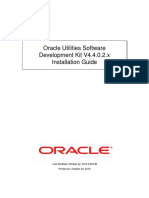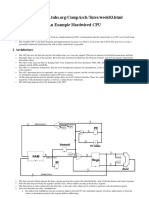0 ratings0% found this document useful (0 votes)
10 viewsCloud Stroge
Cloud Stroge
Uploaded by
huntedzone4The document discusses cloud storage, including what it is, how it works, the benefits and types of cloud storage. It covers public, private, hybrid and community cloud storage models and discusses advantages like accessibility and cost effectiveness as well as disadvantages like internet dependency and privacy concerns.
Copyright:
© All Rights Reserved
Available Formats
Download as PPTX, PDF, TXT or read online from Scribd
Cloud Stroge
Cloud Stroge
Uploaded by
huntedzone40 ratings0% found this document useful (0 votes)
10 views12 pagesThe document discusses cloud storage, including what it is, how it works, the benefits and types of cloud storage. It covers public, private, hybrid and community cloud storage models and discusses advantages like accessibility and cost effectiveness as well as disadvantages like internet dependency and privacy concerns.
Original Description:
cloud stroge
Original Title
cloud stroge
Copyright
© © All Rights Reserved
Available Formats
PPTX, PDF, TXT or read online from Scribd
Share this document
Did you find this document useful?
Is this content inappropriate?
The document discusses cloud storage, including what it is, how it works, the benefits and types of cloud storage. It covers public, private, hybrid and community cloud storage models and discusses advantages like accessibility and cost effectiveness as well as disadvantages like internet dependency and privacy concerns.
Copyright:
© All Rights Reserved
Available Formats
Download as PPTX, PDF, TXT or read online from Scribd
Download as pptx, pdf, or txt
0 ratings0% found this document useful (0 votes)
10 views12 pagesCloud Stroge
Cloud Stroge
Uploaded by
huntedzone4The document discusses cloud storage, including what it is, how it works, the benefits and types of cloud storage. It covers public, private, hybrid and community cloud storage models and discusses advantages like accessibility and cost effectiveness as well as disadvantages like internet dependency and privacy concerns.
Copyright:
© All Rights Reserved
Available Formats
Download as PPTX, PDF, TXT or read online from Scribd
Download as pptx, pdf, or txt
You are on page 1of 12
Introduction
What is cloud storage?
How does cloud storage work?
Cloud Storage - Benefits
Types of Cloud Storage
Advantages of Cloud Storage
Disadvantages of Cloud Storage
Conclusion
Cloud storage is a model of data storage in which
the digital data is stored in logical pools, the
physical storage spans multiple servers (and often
locations), and the physical environment is typically
owned and managed by a hosting company .
Cloud storage is a cloud computing model that
allows users to save data or media files on remote
servers that are maintained by a cloud-based service
provider.
Concept
Cloud storage is a method of storing data
on servers located outside of an
organization's premises .
Redundancy
Core of cloud computing
Equipment
Data
servers Power
supplies
Data files
Replication
With cloud storage, there's no need for
CDs, external hard drives, or localized
servers.
Files can be accessed from any device
with an internet connection.
Data is quickly and automatically updated
in the cloud and available for your
retrieval whenever you need it.
Public cloud storage
Private cloud storage
Hybrid cloud storage
Community cloud storage
01 0 03 04
Public cloud
storage
2
Private cloud storage Hybrid cloud storage
Community cloud storage
Community cloud storage
Public cloud storage is a Private cloud storage is a Hybrid cloud storage is a
is a shared cloud
model that provides data secure cloud computing storage infrastructure that
computing service
storage on a pay-per-use environment that is combines private and
environment that allows
basis.Public cloud services dedicated to a single public cloud resources to
multiple organizations to
are scalable, flexible, and organization, and is also create an integrated
share resources and
cost-effective. known as the internal or storage architecture.
services based on
corporate cloud. common requirements.
Cost
Purchasing physical storage can be expensive. Without the need for
hardware cloud storage is exceptionally cheaper per GB than using external
drives.
Accessibility
Using the cloud for storage gives you access to your files from anywhere
that has an internet connection.
Recovery
In the event of a hard drive failure or other hardware malfunction,
you
can access your files on the cloud. It acts as a backup solution for your local
storage on physical drives.
Security
Cloud storage providers add additional layers of security to their services.
Internet Connection
Cloud based storage is dependent on having an internet connection. If you
are on a slow network you may have issues accessing your storage.
Hard Drives
Cloud storage is supposed to eliminate our dependency on hard
drives right?
Well some business cloud storage providers require physical hard drives as
well.
Privacy
When you use a cloud provider, your data is no longer on your physical
storage.
So who is responsible for making sure that data is secure? That's a gray
area that is still being figured out
Grid Computing was the last research-led centralised
approach.
However there are concerns that the
mainstream adoption of cloud computing could
cause many problems for users.
Many new open source systems appearing that
you can
install and run on your local cluster.
You might also like
- RF-7800V-HH Radio Operation ManualDocument285 pagesRF-7800V-HH Radio Operation ManualCarlos Henrique100% (5)
- Functional Requirement Specification DocumentDocument4 pagesFunctional Requirement Specification Documentcimuthmulya54% (13)
- Oracle Utilities Software Development Kit V4.4.0.2.x Installation GuideDocument33 pagesOracle Utilities Software Development Kit V4.4.0.2.x Installation GuidepothuguntlaNo ratings yet
- Cloud InfographicDocument6 pagesCloud Infographicdhanush yadavNo ratings yet
- Titel SelactiveDocument18 pagesTitel SelactiveDe HNo ratings yet
- Overview of Cloud StorageDocument4 pagesOverview of Cloud StorageSpidey McuNo ratings yet
- ABSTRACTDocument14 pagesABSTRACTdjamitbravoNo ratings yet
- SSRN Id3649074Document3 pagesSSRN Id3649074Riva MakNo ratings yet
- Cloud ComputingDocument40 pagesCloud ComputingHimanshu SoniNo ratings yet
- Chapter 2.2Document21 pagesChapter 2.2Anurag SinghNo ratings yet
- CLOUD STORAGE - Computer ScienceDocument18 pagesCLOUD STORAGE - Computer Sciencedhanstar18No ratings yet
- Gacc - Bca507 - Unit 4 NotesDocument20 pagesGacc - Bca507 - Unit 4 NotesAkashNo ratings yet
- Secure Cloud Computing Using Aes and Rsa Algorithms: K.R.MonishaDocument6 pagesSecure Cloud Computing Using Aes and Rsa Algorithms: K.R.Monishajayashree dNo ratings yet
- Az 900Document95 pagesAz 900Ion ArseneNo ratings yet
- Fundamentals of Cloud ComputingDocument24 pagesFundamentals of Cloud ComputingRahul BorateNo ratings yet
- Presious SeminarDocument7 pagesPresious SeminaritivehjesseNo ratings yet
- Cloud Deployment Techniques & ApplicationsDocument10 pagesCloud Deployment Techniques & ApplicationsArul Ambalavanan ThenappenNo ratings yet
- Information SearchDocument11 pagesInformation SearchRatnaprabha BirwadkarNo ratings yet
- Implementation of Storage in Virtual Private Cloud Using Simple Storage Service On AWSDocument5 pagesImplementation of Storage in Virtual Private Cloud Using Simple Storage Service On AWSlemmesurvivehp03No ratings yet
- Cloud Deployment ModelsDocument17 pagesCloud Deployment ModelsaaradhanaNo ratings yet
- Working With Cloud-Based Storage: CSE423 Virtualization and Cloud ComputingDocument27 pagesWorking With Cloud-Based Storage: CSE423 Virtualization and Cloud Computingjai LakhinanaNo ratings yet
- Lab Manual CloudDocument49 pagesLab Manual CloudTed Breaker50% (2)
- Cloud - Storage by AnshuDocument13 pagesCloud - Storage by AnshuAnshuPC 2907No ratings yet
- Topics Page NoDocument12 pagesTopics Page NoRozy BharimalNo ratings yet
- Cloud: Figure - The Symbol Used To Denote The Boundary of A Cloud EnvironmentDocument27 pagesCloud: Figure - The Symbol Used To Denote The Boundary of A Cloud Environmentαηαητ αφπαωαΙNo ratings yet
- Seminaroncloudcomputingbyprashantgupta 130712214346 Phpapp01Document26 pagesSeminaroncloudcomputingbyprashantgupta 130712214346 Phpapp01PLHNo ratings yet
- 3rd Unit AIDocument11 pages3rd Unit AISujani MahadikarNo ratings yet
- Cloud ComputingDocument11 pagesCloud ComputingRatnaprabha BirwadkarNo ratings yet
- Define Cloud ModelsDocument2 pagesDefine Cloud ModelsgamyNo ratings yet
- Np05cp4a230042 Tumyanghang LawotiDocument5 pagesNp05cp4a230042 Tumyanghang LawotiBìdûr SîwãkötïNo ratings yet
- Data Storage Technology and Its Development Based On Cloud ComputingDocument4 pagesData Storage Technology and Its Development Based On Cloud ComputingLong Phùng PhiNo ratings yet
- Green Modern Monthly Updates School Newspaper Classroom News A4 Email NewsletterDocument2 pagesGreen Modern Monthly Updates School Newspaper Classroom News A4 Email NewsletteryuktaNo ratings yet
- Cloud StorageDocument7 pagesCloud Storagesankit120kNo ratings yet
- Cloud Deployment ModelDocument3 pagesCloud Deployment ModelShivaji YadavNo ratings yet
- Cloud Storage SeminarDocument11 pagesCloud Storage SeminarToyeebNo ratings yet
- Cloud Deployment ModelDocument20 pagesCloud Deployment ModelPraveen PatelNo ratings yet
- Cloud ComputingDocument7 pagesCloud ComputingSumaiya KhanNo ratings yet
- Cloud StroageDocument10 pagesCloud StroagePUNJABI JUTTNo ratings yet
- 4 Cloud-ComputingDocument14 pages4 Cloud-Computingshewaledipa2210No ratings yet
- Cloud StoragepptDocument8 pagesCloud StoragepptArshdeep SinghNo ratings yet
- Cloud StorageDocument8 pagesCloud StorageUchechukwu MarizuNo ratings yet
- Cloud ComputingDocument18 pagesCloud ComputingReena GharatNo ratings yet
- Name - Abhijit Saha Roll No. - 0213 Subject - IT For Business (ISMM4101-T) Topic - Cloud ComputingDocument10 pagesName - Abhijit Saha Roll No. - 0213 Subject - IT For Business (ISMM4101-T) Topic - Cloud ComputingAbhijit SahaNo ratings yet
- MCA Cloud Storage ReportDocument13 pagesMCA Cloud Storage ReportJim SolerNo ratings yet
- Better Backup Enero 2017Document2 pagesBetter Backup Enero 2017INFORME HIPICO SEMANALNo ratings yet
- MarkCarlson Cloud Data Management CDMI PDFDocument29 pagesMarkCarlson Cloud Data Management CDMI PDFSNEHA RAMKRISHNA HAWALDARNo ratings yet
- Sagar de Duplication PaperDocument2 pagesSagar de Duplication PaperK V D SagarNo ratings yet
- Presentation Cloud Computing: Presented By: Swapnil Rastogi B.E (C.S) Viiith SemDocument12 pagesPresentation Cloud Computing: Presented By: Swapnil Rastogi B.E (C.S) Viiith Semswap1901No ratings yet
- Cloud Computing2Document14 pagesCloud Computing2MeganadhanNo ratings yet
- Data MangementDocument4 pagesData Mangementessid sabraNo ratings yet
- Private Cloud Notes - Dedicated PDFDocument11 pagesPrivate Cloud Notes - Dedicated PDFPratik JainNo ratings yet
- Cloud ComputingDocument121 pagesCloud Computingchandra reddyNo ratings yet
- 1 IntroductionDocument31 pages1 Introductionyusufmw05No ratings yet
- Unit-1 Part-1-1Document30 pagesUnit-1 Part-1-1suarchod deveshNo ratings yet
- 1.list Out Some Cloud Storage Use Cases: 1.cost Savings Iaas Helps Reduce Your Upfront Capital Expenditures. ..Document2 pages1.list Out Some Cloud Storage Use Cases: 1.cost Savings Iaas Helps Reduce Your Upfront Capital Expenditures. ..janapalaamruthavaniNo ratings yet
- UI Cloud Class 5.2Document10 pagesUI Cloud Class 5.2shamaparveenNo ratings yet
- Unit 1 Cloud ComputingDocument22 pagesUnit 1 Cloud Computingyuvarajy275No ratings yet
- CC Module 2Document49 pagesCC Module 2yashuop46No ratings yet
- Intro CC - 900 - 1 - NGDocument5 pagesIntro CC - 900 - 1 - NGNeha GuptaNo ratings yet
- Microsoft Cloud Storage For Enterprise ArchitectsDocument5 pagesMicrosoft Cloud Storage For Enterprise ArchitectsjaviyahooNo ratings yet
- Cloud Computing: Amandeep Ummat Cse CecDocument39 pagesCloud Computing: Amandeep Ummat Cse CecAnkitNo ratings yet
- CC Unit3 Revised FinalDocument31 pagesCC Unit3 Revised Finalsameer shaikNo ratings yet
- Cloud Computing Made Simple: Navigating the Cloud: A Practical Guide to Cloud ComputingFrom EverandCloud Computing Made Simple: Navigating the Cloud: A Practical Guide to Cloud ComputingNo ratings yet
- Automatic Weed Detector: A Project Report Submitted ToDocument11 pagesAutomatic Weed Detector: A Project Report Submitted ToAnish Thota100% (1)
- HK570USER Manual20161027Document32 pagesHK570USER Manual20161027KENROD OFFICE EQUIPMENTNo ratings yet
- MODULE-5 FILE & Their OrganizationDocument13 pagesMODULE-5 FILE & Their OrganizationRal RalteNo ratings yet
- Hyperion Planning - InstallationDocument248 pagesHyperion Planning - Installationfriendly_pplNo ratings yet
- Eds 9915 SeriesDocument1 pageEds 9915 SeriesAnildo Eldivar De Oliveira SarmentoNo ratings yet
- ELS 24 Maret 2023 Rev 1.0Document16 pagesELS 24 Maret 2023 Rev 1.0rafliNo ratings yet
- GARMIN GTX330 ADS-B Equipment ListDocument12 pagesGARMIN GTX330 ADS-B Equipment ListBruno100% (2)
- 2 - Register Transfer and Microoperations - 1Document31 pages2 - Register Transfer and Microoperations - 1shabanaNo ratings yet
- Whats NewDocument282 pagesWhats NewArvind ShuklaNo ratings yet
- Ier 400 V4 GB 11 2009Document2 pagesIer 400 V4 GB 11 2009Gustavo SchaposchnikNo ratings yet
- Bcit Lab Manual AnsDocument16 pagesBcit Lab Manual Ansewnetu kassaNo ratings yet
- Xi Maint Manual Rev 2 PDFDocument218 pagesXi Maint Manual Rev 2 PDFJonathan LongNo ratings yet
- Introduction To Computing Prelim Exam Matteo Cheesé 2Document11 pagesIntroduction To Computing Prelim Exam Matteo Cheesé 2Loving AngelNo ratings yet
- Cemdt 172Document2 pagesCemdt 172zubairNo ratings yet
- Lorawan CRDocument5 pagesLorawan CRMaria Clara Santos QueirozNo ratings yet
- ManushaK JavaDocument5 pagesManushaK Javavamshi krishnaNo ratings yet
- Object Oriented Programming CS F213: BITS PilaniDocument22 pagesObject Oriented Programming CS F213: BITS PilaniKHUSHBOO KUMARINo ratings yet
- A Lightweight Continuous Jobs Mechanism For Mapreduce FrameworksDocument22 pagesA Lightweight Continuous Jobs Mechanism For Mapreduce FrameworksubinetNo ratings yet
- An Example Hardwired CPUDocument29 pagesAn Example Hardwired CPUMauro Ferreira De LimaNo ratings yet
- CST 445 M1-1Document37 pagesCST 445 M1-1shyam krishnan sNo ratings yet
- Delinea Serversuite Unix EvaluationDocument44 pagesDelinea Serversuite Unix Evaluationbyron7cuevaNo ratings yet
- Python Module 1 VtuDocument52 pagesPython Module 1 VtuHarish N ShettyNo ratings yet
- SANCOOCKBOOKDocument144 pagesSANCOOCKBOOKBetty AnghelNo ratings yet
- GCP: Google Cloud PlatformDocument25 pagesGCP: Google Cloud Platformalya khan100% (1)
- Scenario Based 3 (SIDHARTH K RA2011003010008)Document6 pagesScenario Based 3 (SIDHARTH K RA2011003010008)qwerty keypadNo ratings yet
- Steps For Setting Up A VPNDocument3 pagesSteps For Setting Up A VPNathartanveer31No ratings yet
- 91569-00 Fetfundamentals SW Ed4 Pr2 WebDocument66 pages91569-00 Fetfundamentals SW Ed4 Pr2 Webdwight100% (1)

























































































